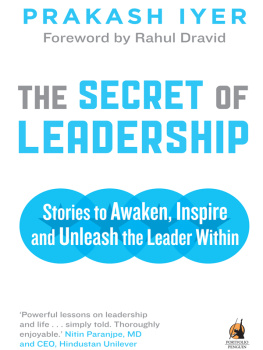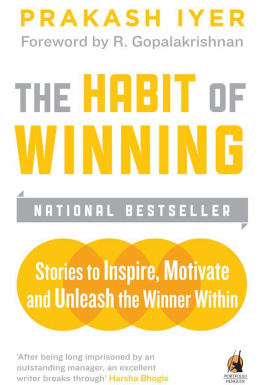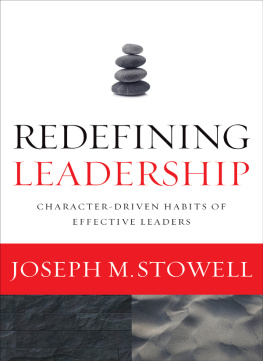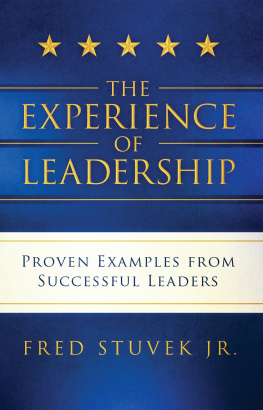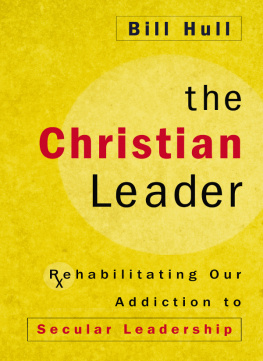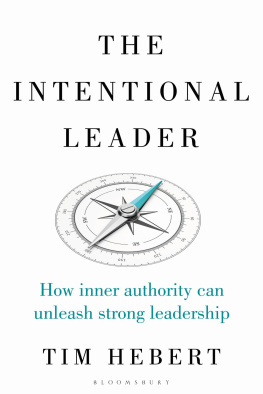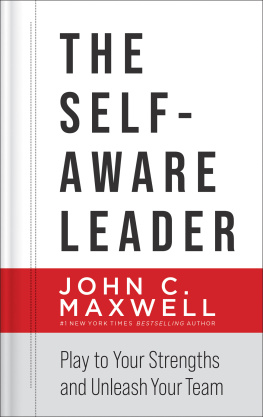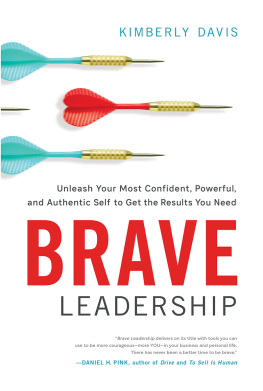Passionate about peopleand cricketPrakash is also a motivational speaker and trained leadership coach. An MBA from IIM Ahmedabad, he is married to Savitha, and they have twin children, Shruti and Abhishek.
Do you have a leadership story youd like to share? Write in to Prakash at .
Foreword
Storytelling is among the proudest of Indian traditions, and from ancient times, it has been associated with imparting wisdom and worldly knowledge. When you read the Panchatantra tales as a child, it was impossible to miss the moral underlying each story. And the Mahabharata, the grandest, the most complex and multi-layered of epics, wasnt merely a masterpiece of storytelling: it was, and remains, a discourse on life and living.
The beauty of stories is that they teach without ever appearing to do so. Most of our early world view and our moral compass have been shaped through the stories we heard in the laps of our mothers and grandmothers without us ever realizing it. We looked forward to bedtime story sessions because the tales enchanted and entertained us, and through them we learned without ever feeling the burden of formal learning. Preaching rarely works with children, and I suspect it works no better with adults. In general, we are resistant to being handed down wisdom in black-and-white terms.
Books have always been my favourite gifts, both to give and to receive, and one of my cherished memories is to be given a copy of Jonathan Livingston Seagull by the late former Indian Test cricketer Hanumant Singh, who was our head coach at the under-17 national cricket camp. For those who are not familiar with it, it is a fable about a young seagull fascinated with flight.
He was the exact opposite of the other gulls to whom flying was necessary only in order to eat. But to Jonathan, it was flying that mattered, not eating. It was the nuances of flying that obsessed him and while his friends and relatives spent their time searching for scraps of food, Jonathan practised flying, sometimes putting his life at risk in the pursuit of excellence. This seemingly reckless obsession leads to him being banished from the gull community but he soon finds himself in the company of a group of advanced gulls who share his passion. Under their guidance, he not only fulfils his ambitions but also becomes, in the words of his peers, a one-in-a-million gull.
It was as much a story about seeking perfection as about tenacity and staying true to the calling of the heart. The book was slim and easy to read and for an impressionable sixteen-year-old, it was a stirring and hugely motivating story. I realize now that Mr Singh was perhaps trying to convey a message to me without giving me a lecture which I might not have been keen on. It worked. And I was reminded of this many years later while reading Prakash Iyers first book, The Habit of Winning.
I was primarily drawn to it because sports was a running theme in it and because I had been a first-hand witness to some of the stories he had narrated. It was apparent that he was a huge sports fan, but what I found thoroughly absorbing and illuminating was the manner in which he had dipped into the inspirational sports stories and turned them into valuable lessons in corporate life.
The Secret of Leadership is a natural and delightful sequel. Prakash has spent many years in leadership roles in some of Indias best corporate houses and if his books are any indication, I can imagine him to be an affectionate mentor and guide to his colleagues.
The new book draws relatively less from sports but it has the same qualities that I found attractive in the first bookstartling simplicity, lucid and easy-to-read prose and the warmth and intimacy of the narrator. The real strength of the book is that the message becomes apparent even while you are reading the stories, and you end up telling yourself, Hey! I knew this. But often we are blind to the most obvious things and need to be guided to the knowledge we might already possess. Prakash does it expertly and gently. It is apparent he has researched extensively for his stories and used the wealth of his personal experience, but he fuses these seamlessly to give his books an allegorical quality.
Both my children enjoy listening to stories and my wife likes reading to them and sharing with them the tales that we have heard from our parents. As they grow older, I am looking forward to adding Prakashs books to the reading list.
This is a book that can inspire and motivate even as it entertains.
RAHUL DRAVID
Introduction
Climbing Your Mountain
At 29,029 feet above mean sea level, Mount Everest is not only the highest peak in the world. It is also the ultimate symbol of challenge and achievement. To have to climb Mount Everest is to have a seemingly impossible task on your hands. And to be atop the Everest is to experience that unique, top-of-the-world feeling.
Everyone knows that the first people to climb Mount Everest were Sir Edmund Hillary and Sherpa Tenzing Norgay. But not everyone knows that it wasnt their first shot at scaling the worlds highest peak.
The story goes that after a failed attempt some years earlier, Hillary found himself back at the base camp, wondering if hed ever make it to the top. And then suddenly, he stepped out into the sun and, looking up at Mount Everest, he screamed, I will come again and conquer you! Because as a mountain, you cant grow. But as a human, I can!
Maybe Hillary wasnt really screaming at Mount Everest. Perhaps he was just sending out a message to the world at large. A reminder that we can all keep getting better. We all keep growing. And we can all overcome lifes challenges and climb all those mountains we set our sights on.
The book you now hold in your hands is born out of that belief: we can all become better. We can all grow. Theres a leader inside each of uswaiting to be unleashed, waiting to climb that mountain!
Leadership is not just about the head of the organization or the captain of the team. Its about you and me and all of us. Everyone is a leader. It just so happens that some people lead teams, and some lead companies or countries. But we all lead a life. Our own. And make no mistake. How good that life is depends on the leader. On you. There is greatness inside each of us. All you need to do is reach for it. And unleash it.

